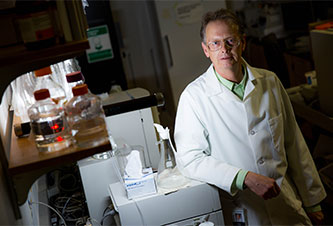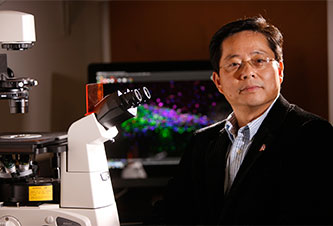The science of aging
By Jan Jarvis

Today there are more than 75,000 centenarians living in the United States, a number that is expected to grow to 600,000 by mid-century.
Why some people reach that milestone while others are burdened with diseases is at the crux of the International Conference on Aging and Disease, beginning Friday at the Stanford School of Medicine.
The International Society on Aging and Disease (ISOAD) event, which UNT Health Science Center helped organize and is co-sponsoring, will bring together scientists from around the globe to explore different perspectives on aging and how it increases disease risk. The conference includes presentations on lasting health, quality of life, and how exercise affects aging.
Historically the science community has explored aging from two different angles, said Michael Forster, PhD, Executive Director and Regents Professor at the Health Science Center’s Institute for Healthy Aging. Some scientists study biological or “normal aging” and its effect on the life span. Others research age-related diseases, such as stroke.
“We want to understand, for example, what happens to cause Alzheimer’s in one person and not another of the same age,” he said. “Biological aging occurs at different rates and could account for why some people get Alzheimer’s and others don’t. But for now, we don’t know.”

Finding such answers becomes all the more important as more people live longer and overwhelm health care resources, said Dr. Forster, who also serves as president of the ISOAD.
It is known that genetics play a role in how long people live, as does lifestyle factors such as diet and exercise. But there’s more to aging.
“The old idea is aging is caused by wear and tear on the body and disease is something else,” Dr. Forster said. “But it may be that certain diseases, such as diabetes, actually promote aging.”
Diabetes, hypertension and other diseases that are considered age-related affect 80 percent of older adults. By slowing down the forces of aging so they occur later in life, it may be possible to prevent or treat these diseases so that people ultimately live longer lives in better health, said Dr. Forster, whose research focuses on oxidative stress in age-associated brain dysfunction.
In the 20th century, the average life expectancy rose from about 49 years to 77 years. Now it’s up to 86 years, largely because of improvements in technology, said Kunlin Jin, MD, PhD, Professor in the Institute for Healthy Aging and co-founder of the ISOAD.
“We want to look at new tools and find ways of helping people live longer and healthier lives,” Dr. Jin said.





Social media